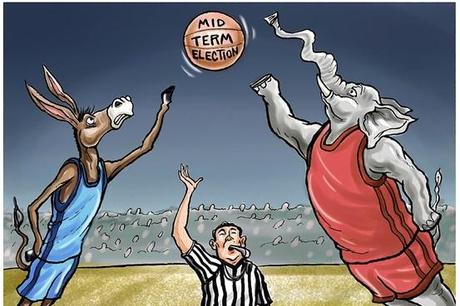
A spot on NPR plugging their election coverage used the phrase "fight for control of the Senate." I don't think "control" is the right word. The question of whether the Democrats will remain in the majority is getting a lot of attention. Isn't it perfectly obvious, though, that being in the majority and having control are very different things? Thanks to the rule about cloture, a supermajority of 60 is needed to "control" the Senate. If you could control the Senate with a 55-45 majority, we'd hear less about "gridlock," and possibly have some meaningful restrictions on gun ownership.
It appears increasingly likely that Democrats will be relegated to minority status in both House and Senate. As I've noted before, a Democratic majority in the House requires something tending toward a Democratic landslide in the country as a whole, and that isn't happening this year. Regarding the Senate, I suggested awhile ago that the chance of Democrats retaining the majority depended upon women--those who vote (or don't) and the ones trying to defend their seats or win Republican ones. I highlighted four: Democratic incumbents Jeanne Shaheen in New Hampshire and Kay Hagan in North Carolina, and Democratic challengers Alison Lundergan Grimes in Kentucky and Michelle Nunn in Georgia. Lundergan Grimes appears to be trailing in her race, against the blandly execrable Mitch McConnell, by a modest but steady margin. The other three races are all very close. Shaheen and Hagan are perhaps slightly ahead, while Nunn is, if anything, trailing by a point or two. Let's suppose Shaheen and Hagan pull through and Nunn falls short. A split in these four red-hued states might look like a decent result for the Democrats. The problem, however, is that, moving west, the red hue to the battle grounds persists: Democrats have no chance holding on to their seats in South Dakota or Montana, and are if anything less than even money in five other races for seats they currently hold--in Louisiana, Arkansas, Iowa, Colorado, and Alaska.
The geography and demographics favor Republicans. But does it really matter? Congress isn't doing anything now (unless you count such empty gestures as voting to repeal "Obamacare"), and it's hard to see why that would change if Republicans become the majority party in the Senate. What are they going to do? Try to match their colleagues in the House for number of staged votes to repeal Obamacare? But what would they replace it with? The thing they admit to liking (you can't be denied coverage because of a previously existing condition) won't work without the thing they say they can't abide (the "individual mandate"). They aren't serious. For them, Ebola, which has so far killed one person in our country, is a fit subject for national hysteria, while measues to curb the scourge of gun violence are--praise God!--prohibited by the Constitution.
In North Carolina, Hagan's opponent recently declared, in a debate:
Ladies and gentlemen, we've got an Ebola outbreak. We have bad actors that can come across our border. We need to seal the border.
This may prove to be a winning "message." Possibly it is a stroke of genius, for keeping Ebola-stricken Mexicans out of the country is a promise the GOP should be able to keep.
